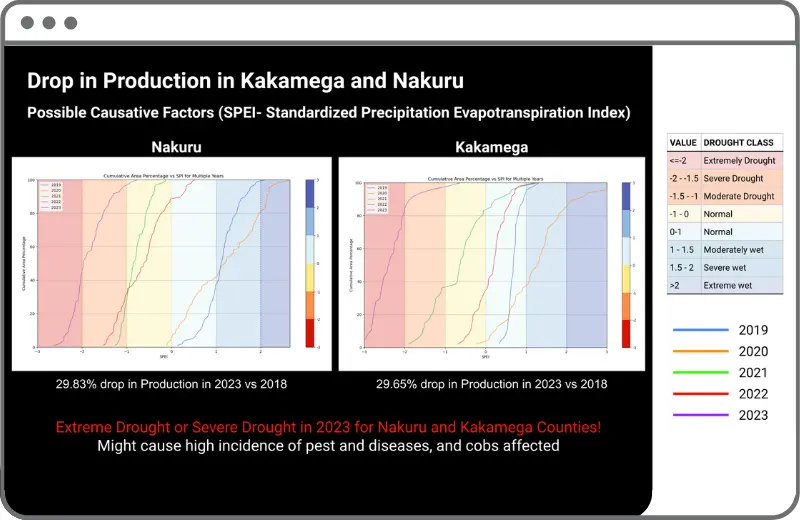In an era marked by unpredictable weather patterns and climate shifts, agriculture and food supply chains face unprecedented challenges. This volatility pressures supply chain planning, demanding better and earlier insights into crop yields and quality. Advanced agricultural technology solutions are transforming the landscape, providing the tools needed to mitigate risks due to climate change in procurement and supply chain operations.
Unpredictable weather and the need for readiness
Climate change has made unpredictable weather patterns the new normal, impacting agriculture and food supply chains in unprecedented ways. This unpredictability puts enormous pressure on supply chain planning, making reliable data essential. According to the FAO, climate change could reduce global crop yields by up to 25% by 2050. To combat this, companies need early visibility into commodity availability and quality, accurate yield estimations, and insights into new geographies for expansion.
Leveraging AI/ML - powered intelligence solutions
Imagine knowing months in advance the exact quantity and quality of your key commodities. Advanced AI and ML models make this possible by analyzing vast amounts of data to provide precise predictions. These technologies can estimate early sowing trends and identify causes for yield drops, providing granular insights that enhance preparedness and responsiveness. For instance, in Kenya, advanced regional intelligence solutions have accurately predicted early sowing trends and identified factors contributing to yield drops in maize crops. This level of detail allows companies to be proactive, addressing issues before they escalate.

Insights from Cropin’s Kenya Project
Accurate yield estimates with smart sampling
Climate chaos often leaves companies guessing about crop yields. According to a World Bank study, yield variability due to climate change is a significant global risk. Traditional yield estimation methods are prone to human error and often provide unreliable data. Scientific Smart Sampling frameworks improve yield forecasts by 30-40%, integrating human expertise with technology to deliver reliable, data-backed insights for better decision-making. By adopting these advanced sampling techniques, companies can make more accurate forecasts, ensuring that supply chain disruptions are minimized.
Engaging farmers for better outcomes
Effective engagement with farmers is crucial for achieving impactful results. Modern agri-tech solutions enable direct communication with farmers in their local languages, delivering predictive intelligence-based alerts and notifications through email, SMS, WhatsApp, and mobile apps. This approach builds trust and significantly enhances farmer engagement. For example, a leading CPG company increased its active loyal farmer base from 10% to 25% within two years by leveraging advanced engagement strategies. This not only improves yield quality and consistency but also strengthens the supply chain’s overall resilience.
Expanding to new geographies
Agri-intelligence at the regional level provides essential insights for derisking food supply chains. Diversifying sourcing regions can reduce the impact of local climate events and stabilize supply chains, according to McKinsey. Strategic expansion ensures efficient demand management and minimizes climate-related risks. Identifying suitable current and future sourcing regions based on specific crop value chains helps companies build a more resilient supply chain. By diversifying their sourcing regions, companies can better manage the demand and mitigate the risks associated with climate change.
Real-time monitoring and responsible sourcing
Real-time data collection is vital for responsive supply chain management. Digital tools enable real-time monitoring, overcoming delays associated with traditional methods. This instant access to field data supports timely decision-making and operational efficiency. With growing consumer demand for responsibly sourced products, advanced platforms support traceability and validate sustainable agriculture practices. Digital Measurement, Reporting, and Verification (dMRV) tools monitor and report farmland sustainability, integrating data to visualize and report against defined goals. A Nielsen survey found that 66% of global consumers are willing to pay more for sustainable brands, emphasizing the importance of responsible sourcing.
Enhance Procurement Strategies with Cropin
Gain competitive edge with Cropin’s predictive intelligence and data-driven solutions
The Cropin advantage: transforming procurement decisions
Cropin’s experience in digitally transforming vast amounts of farmland has culminated in comprehensive crop knowledge graphs. This expertise translates into early visibility, better forecast intelligence, and cost savings for clients. Advanced solutions unlock data value and provide a strategic edge in making smarter procurement decisions amidst climate challenges.
A major global beverage company faced challenges in sourcing consistent quality barley due to erratic weather patterns. By implementing AI-powered predictive analytics, the company could forecast yield variations accurately and adjust its procurement strategy accordingly. This resulted in a 30% improvement in yield quality and a 25% reduction in supply chain disruptions. Such success stories underline the transformative potential of agri-tech solutions in enhancing supply chain resilience and efficiency.
Conclusion
The future of agriculture lies in embracing technology to create more resilient and sustainable food supply chains. According to the International Food Policy Research Institute, investing in agricultural technology can increase global food production by up to 67% by 2050. This is a significant leap towards ensuring food security in the face of climate change. Companies that adopt these technologies gain a competitive edge and contribute to a more sustainable and food-secure world.
In today’s climate, procurement is no longer a guessing game but a strategic battle. Agri-tech solutions provide the tools needed to win this battle, ensuring resilience and sustainability in the food supply chain. By leveraging AI-driven intelligence, the future of agriculture is not just being predicted; it is actively being built, one farm, one crop, one acre at a time.








